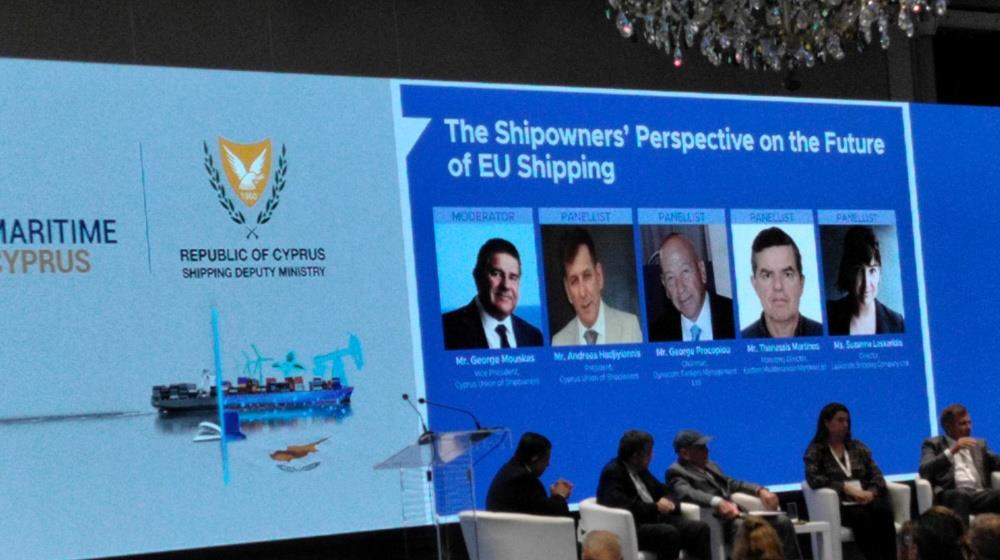George Mouskas, Vice President, Cyprus Union of Shipowners acted as Moderator on a panel discussion on ‘The Shipowners' perspective on the future of EU shipping’ at the Maritime Cyprus conference underway in Limassol.
Making up the panel were Andreas Hadjiyiannis, President, Cyprus Union of Shipowners, George Procopiou, Chairman, Dynacom Tankers Management Ltd, Thanassis, Martinos, Managing Director, Eastern Mediterranean Maritime Ltd, and Suzanna Laskaridis, Director, Laskaridis Shipping Company Ltd.
When asked to give his position, Hadjiyiannis suggested that the new ships being used were already contributing to lessening the shipping industry’s impact on the environment and that further measures would be better targeted at others, such as those whose cargo was being transported. He also said that feasible alternative fuels would be embraced but that other measures, such as some of those suggested in the EU’s ETS scheme did not appear to make enough impact to warrant the additional expense. Optimisation of the industry, Hadjiyiannis said, would be far more effective.
Procopiou said that while politicians were able to make promises, business owners had to do what was possible.
“We are alone,” he said, referring to shipowners, continuing, “We do not need protection but we do not need harassment either.” Procopiou said that the most effective ships were already being purchased and that it would ultimately be consumers who would pay for transportation disruptions.
Procopiou wondered why the shipping industry did not follow in the steps of the automobile industry when it came to making vehicles more energy efficient. This put the responsibility in the hands of engine and shipbuilders, he suggested.
Obligations to reach 50% emissions by 2030 and net zero by 2050 was, according to the ship builders’ response to Procopiou’s queries, could not yet be achieved by the creation of new vessels, he also warned.
Laskaridis said that because more research into vessels using alternative fuels was required before such choices could be made, orders even now ultimately still involved conventional crafts.
Martinos, on his part, noted that a two-tier market would be created as owners in other parts of the world would not necessarily invest in ships fitting within Europe’s requirements, although these would likely be chartered. He also suggested that nations in other parts of the world would not be likely to adopt the same regulations enforced by the EU in terms of shipping emissions etc.
Hadjiyiannis also noted that the close monitoring European shipowners would be subjected to would be very different from their non-European counterparts.
“On the one hand, you have the European shipowner who will be immediately penalized and then the non-European shipowners, where who knows when and how they will be made to pay. So, it is very unfair and another burden that hurts competition,” he continued.
Procopiou repeated that it would be the consumer who would ultimately have to shoulder the burden of additional costs. “The biggest expense is bulkers,” he continued, “so we have vested interest in reducing them.” This should be the direction efforts to protect the environment should be moving in, he continued.
“The politicians are promising the desirable,” Procopiou said, but we have to do what is doable. “Shipowners are the biggest environmentalists that exist, we love the sea, we don’t want to destroy it. That is why we are in this business, that is why we care,” he added.
Martinos revealed that his concerns for the shipping industry were geopolitical.
“China is our biggest client. What happens if in the future we are asked to have sanctions against China?” he said. He said that shipowners were not involved in politics and needed to go where there was demand and particularly where there was the need for what they were transporting. “Freedom of trade is very important to us,” he concluded.
Procopiou suggested that sanctions were not effective, giving the example of Iran where the country had instead begun to create its own products and services.
Laskaridis, on her part, said that taxation changes could lead some companies to seek solutions outside the EU and that it was important to remember the shipping sector’s contribution to the global economy.
The floor was then opened up to the audience for questions.









